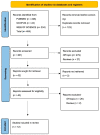The Impact of Cesarean Section Delivery on Intestinal Microbiota: Mechanisms, Consequences, and Perspectives-A Systematic Review
- PMID: 38256127
- PMCID: PMC10816971
- DOI: 10.3390/ijms25021055
The Impact of Cesarean Section Delivery on Intestinal Microbiota: Mechanisms, Consequences, and Perspectives-A Systematic Review
Abstract
The relationship between cesarean section (CS) delivery and intestinal microbiota is increasingly studied. CS-born infants display distinct gut microbial compositions due to the absence of maternal birth canal microorganisms. These alterations potentially link to long-term health implications like immune-related disorders and allergies. This correlation underscores the intricate connection between birth mode and the establishment of diverse intestinal microbiota. A systematic literature review was conducted on the PubMed, Scopus, and Web of Science databases by analyzing the articles and examining the intricate interactions between CS delivery and the infant's intestinal microbiota. The analysis, based on a wide-ranging selection of studies, elucidates the multifaceted dynamics involved in CS-associated shifts in the establishment of fetal microbiota. We also explore the potential ramifications of these microbial changes on neonatal health and development, providing a comprehensive overview for clinicians and researchers. By synthesizing current findings, this review contributes to a deeper understanding of the interplay between delivery mode and early microbial colonization, paving the way for informed clinical decisions and future investigations in the field of perinatal medicine.
Keywords: Bacteroides; caesarean delivery; delivery mode; infant gut microbiota; infant oral microbiota; neonatal bacterial assemblages; transmission of maternal strains.
Conflict of interest statement
The authors declare no conflicts of interest.
Figures



References
-
- Zhou P., Zhou Y., Liu B., Jin Z., Zhuang X., Dai W., Yang Z., Feng X., Zhou Q., Liu Y., et al. Perinatal Antibiotic Exposure Affects the Transmission between Maternal and Neonatal Microbiota and Is Associated with Early-Onset Sepsis. mSphere. 2020;5:e00984-19. doi: 10.1128/mSphere.00984-19. - DOI - PMC - PubMed
-
- Ballini A., Santacroce L., Cantore S., Bottalico L., Dipalma G., Topi S., Saini R., De Vito D., Inchingolo F. Probiotics Efficacy on Oxidative Stress Values in Inflammatory Bowel Disease: A Randomized Double-Blinded Placebo-Controlled Pilot Study. Endocr. Metab. Immune Disord.-Drug Targets. 2019;19:373–381. doi: 10.2174/1871530319666181221150352. - DOI - PubMed
-
- Zhou L., Qiu W., Wang J., Zhao A., Zhou C., Sun T., Xiong Z., Cao P., Shen W., Chen J., et al. Effects of Vaginal Microbiota Transfer on the Neurodevelopment and Microbiome of Cesarean-Born Infants: A Blinded Randomized Controlled Trial. Cell Host Microbe. 2023;31:1232–1247.e5. doi: 10.1016/j.chom.2023.05.022. - DOI - PubMed
-
- Kang D.-W., Adams J.B., Gregory A.C., Borody T., Chittick L., Fasano A., Khoruts A., Geis E., Maldonado J., McDonough-Means S., et al. Microbiota Transfer Therapy Alters Gut Ecosystem and Improves Gastrointestinal and Autism Symptoms: An Open-Label Study. Microbiome. 2017;5:10. doi: 10.1186/s40168-016-0225-7. - DOI - PMC - PubMed
Publication types
MeSH terms
LinkOut - more resources
Full Text Sources
Medical

